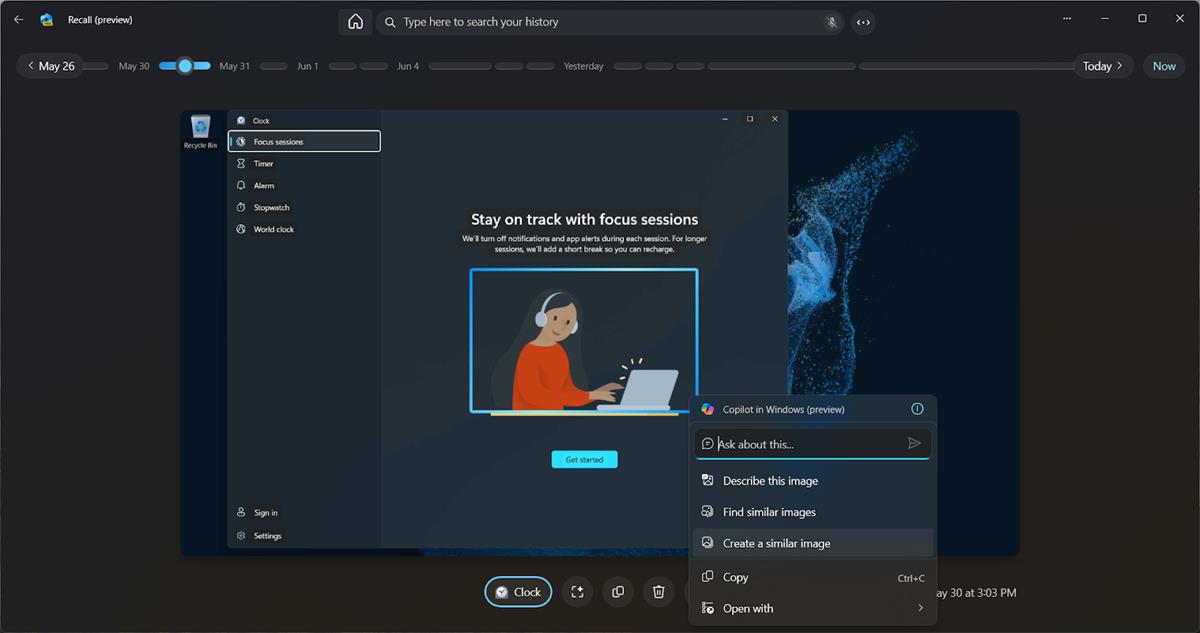If you thought that Microsoft was done with Recall after its catastrophic reveal as the main feature of Copilot+ PCs, you are mistaken.
Microsoft wants to bring it back this October 2024. Good news is that the company plans to introduce it in test builds of the Windows 11 operating system in October. In other words: do not expect the feature to hit stable Windows 11 PCs before 2025 at the earliest.
While Recall may have sounded great on paper and on work-related PCs, users and experts alike expressed concern. Users expressed fears that malware could steal Recall data to know exactly what they did in the past couple of months.
Others did not trust Microsoft to keep the data secure. We suggested to make Recall opt-in, instead of opt-out, to make sure that users knew what they were getting into when enabling it.
Microsoft pulled the Recall feature shortly after its announcement and published information about its future in June. There, Microsoft said that it would make Recall opt-in by default. It also wanted to improve security by enrolling in Windows Hello and other features.
Not a problem for me, since I plan to stop using Windows in 2025.
Much like Chrome forced me to Firefox, Windows will force me to Linux. It is inevitable.
I recommend at least dual booting before then, so you can get a feel for what the alternative is capable of. You don’t want to switch, run into a hiccup, then have to decide whether to push through whatever incompatibility that is, or switch to something terrible. Work through those problems at your own pace in a dual-boot setup, and once you’re ready to ditch Windows, everything is already ready.
Yeah, that’s what I actually did on my secondary computer (laptop), where I dual booted Windows 10 and openSUSE Tumbleweed, before switching entirely to openSUSE.
I am planning to do the same for my main PC, but instead of doing different partitions for each OS, I will most likely give Linux (probably openSUSE as well, but I might try Fedora Atomic this time) an entire SSD for it’s use.
Yeah, on my desktop, I have a separate disk for Windows and Linux, and since I haven’t booted into Windows in over a year, I’ll probably repurpose it as a data drive or something (or maybe upgrade my NAS boot drive).
While Recall may have sounded great on paper and on work-related PCs,
Ah yes, all those IT people were probably thrilled with the prospect of Microsoft getting sent constant screenshots of their employees’ machines, with all those company secrets, sensitive information, and everything
Boy howdy I’m just imagining HIPAA with this.
Also data retention and security it’s a nightmare for Title IX and FERPA as well.
Another thing is Microsoft hasn’t been talking about compression either, how large are these files? What does it do with networked drives? How do we know metadata collection isn’t being expanded?
The crazy part to me is a local solution (shadow copy) has been around for ever. Why this is even a thing at all is just insane to me.
Shadow copy is a completely different thing. Shadow copy creates snapshots(used for version history, among other uses) of files. Recall is a screen recording software, that includes OCR and maybe some AI stuff. At this time, at least, it too is all local. It just isn’t secure in the least.
And functionaly pointless other then spying on users (and there is also software for that).
My point is, like a lot of things today, this is a solution looking for a problem.
I’m not diagreening with that. Although it could be useful, I often forget where I saved things, and something that let’s my search my worn history would be rad, but there’s zero chance this won’t be abused by a large list of people, including but not limited to Microsoft, spouses, bosses, malware, governments, every random application, Facebook, and Microsoft.
And is just as useful as a functioning search tool…
It never sounded great on paper to me…
Hear me out, I actually had a similar concept in mind, but only for files, emails, calendar entries, bookmarks, that kind of stuff. Things that I actually saved on my computer, not random screenshots of what I’m looking at. This is a huge difference IMO. What I look at should never be saved. Only when I specifically save something, should it persist. I would actually love a FOSS, local and private AI solution that would allow me to simply query anything I’ve ever saved on my computer with a simple search request, without having to waste time on naming my files. Even better if it would understand the context and stuff. This would especially be useful with photos, as they never have proper filenames, just some generic random stuff. Or with code, if the AI search could understand the context of my code and I could just pull it up using a search terms like “the function for handling DNS over TLS requests a few years ago” or whatever, and it would just pull out that one function from the project. Even better if this could be integrated with a separate, generative AI model, that could make small changes to my already existing stuff. I don’t know, e.g. “refactor the function to use LibreSSL instead of OpenSSL TLS library”.
Thing is, it BARELY changes performance
Windows users got no right to complain about performance.
what? Im not trying to be rude but i dont understand why you’re saying that
Lol, it’s a running joke that Windows have terrible performance.
aah ok, yeah that didnt make sense to me because for gaming pc’s at least, windows has equivalent performance
A lot of games aren’t made with efficiency in mind anyway, so you probably wouldn’t notice for your usecase.
oh, i use linux, iwas just pointing out that for games there isnt much difference
Yet another reminder that alternatives, where your privacy is not for sale, and your hardware belongs to you, actually exist in 2024
it’s for corporations to deploy on all their worker drones’ workstations
I wish they would do a much better job of distinguishing corporate workstation versions of Windows and Home versions of Windows. Put all this MS ecosystem garbage on the workstation version, and make the Home version a stripped down to the essentials OS. Which is what most of us try to do with tools like ShutUp10, anyway.
i’ll do you one better: all PCs at my job are running win10 LTSC, which was meant for specific use cases like running neon signs and shit
And even for that cases it’s bloated as fuck.
I get ads on my workstation. Its fun. I cant remove them without getting permission from the IT department. Meanwhile my home computers have no ads at all.
Ironically, in reality it’s the exact opposite. The home version is pumped to the brim with this dogshit, while the Enterprise version is stripped to the bare necessities. They likely know that other corporations have the balls to sue them for all kinds of reasons
How long before there’s a discovery request for all recall data for a time period and companies start screaming about the risks with recall?
companies start screaming about the risks with recall?
this comment veers pretty close to implying that upper and middle management know a single goddamn thing about tech or cybersecurity OR that they listen to their IT guys
Agreed - if I were evil, I would use this data to look for long periods of static/unchanging desktop screenshots to look for inactivity and employees lying about being there or away.
Honestly this is just an arms race. If the above happens (and if I can come up with that use case think about what will come up when someone actually smart thinks about it.)
The response? I’d make a tool that presses alt-tab every 15 seconds a random number of times - to both keep the computer alive and change the desktop view, maybe move the windows around a bit for variety. A usb rubber ducky would be perfect for this.
Agreed. But if big brother really wants, they can detect a weird program running, a weird hardware being on it, or just that someone is tabbing around without actually doing something.
What do you recommend? What is the most Apple-like+MacBook like?
Elementary is a very polished and user friendly linux distribution designed to familiar to MacOS users.
Any decent laptop for hardware. ElementaryOS for the OS, if you really want the look/feel of macos.
Roger
Edit: its beautiful, is it well-maintained? Do you use it?
I did for a bit, but I’m not a fan of the macos ui, so it wasn’t for me.
A lot of the laptops made by Huawei and Xiaomi are MacBook-like in design at least. Framework is much more repairable though as are business laptops from HP or Dell. Dell in particular has made some quite long battery life laptops in the past like the Latitude 7410 and 7400, though those aren’t particularly new they are at least cheap when bought second hand.
In terms of OS you got to go with some Linux flavor as they offer various DEs some of which are mac like. Obviously macOS and Linux terminals are somewhat similar anyway. PopOS is a great option.
I would not, in good conscience, ever recommend a Dell machine to anyone anymore. Not only the design and build quality have gone down catastrophically, but Dell would take literally every opportunity they have to fuck you over.
XPS machines in particular have a solid history of being good on paper, but a nightmare, once you ever need to contact them about issues
XPS aren’t business machines, just premium consumer machines. They aren’t built to the same standard, as would honestly be expected given they cost less. I’ve had my own bad experiences with an XPS laptop and wouldn’t buy one again. Too many compromises in the name of being thin and lightweight.
To be honest I was more suggesting second hand machines where warranty from the OEM isn’t really a consideration.
I think you will find most OEMs don’t really care about customer support unless you are a business. HP, Asus, and friends all have their own horror stories. There are only a few companies like Framework I actually trust.
Ubuntu or Pop OS use GNOME by default which is similar to macOS
Pop!_OS won’t use GNOME for much longer. They’re currently developing their own desktop called COSMIC.
COSMIC itself has a similar design to macOS
Zorin is a Ubuntu-derived distro that has multiple desktop managers built in, including one that mimics macOS.
Framework
Which OS to go with it?
I am running Kubuntu on mine
If you want “Apple-like” look and feel, KDE Neon, Ubuntu, or Pop_OS! are good first Linux distros to start with.
Linux distro of your choice
deleted by creator
I think Fedora is pretty great. It offers a lot of packages and ships updates quickly, has good performance, doesn’t include much crap, is pretty good security-wise and lets you choose between many desktop environments. There are even more stable and secure immutable versions like Fedora Silverblue, Kinoite and others, along with forks of it like Universal Blue and the distros that are based on it like Bazzite, Aurora, Bluefin or Secureblue.
You can fix it instead of buying a new one, it’s not like Apple
Not until Linux comes pre-deployed on gaming laptops for sale. That’s my market.
Before you ask, I don’t have the know-how to boot into Linux, and I need the portability of a laptop. As well as enjoying gaming to an extent. Pretty niche.
We already have the Steam deck, and SteamOS just got official support for third-party hardware. I don’t think it will take that long until we see gaming laptops or mini PCs preloaded with SteamOS.
Yeah, that would work I guess.
That’s a really good summary of the degradation of software throughout time and the path to recreate software for the people. Thanks for sharing.
Thanks - I love that video and I share it all the time. It gets across the whole idea of why Free (libre) software is important without preaching, and (as you point out) with a reminder that it wasn’t always this way.
Of course it is coming back.
It will keep coming until plebs accept parasite.
Their feature may come back to their OS but their OS isn’t coming back to my hardware.
MS: Here’s a cool new feature!
Users: That is spyware bullshit, fuck off!
MS: But muh ecosystem!
Users: Nobody fucking wants any of that. Now STFU and run my games, grandpa.
MS: sniffs This isn’t over, you little shits.Who thought they were abandoning it?
I doubt they secured it particularly well either, because the nature of proper security is building it from the ground up with security as a core principle, but it was always coming back.
They delayed because “oh shit, people noticed we didn’t even bother with security theater” and to let the backlash die down. They still consider it a major selling point.
By the comments I’ve seen, it seems like no one read their previous announcement where they said they were delaying the feature while they continued work on it. We already knew they were still going to ship it.
Just having it disabled by default is a massive improvement. It’s crazy that they initially considered releasing it with no encryption and it on by default.
It’s less bad for sure. And I can understand, theoretically, the value of “that one think I saw that one time”. I’ve definitely spent way longer than I’d want looking for some random reference I’d seen in the past, and I’m in the process of trying to catalogue all the references in my past nonfiction reading after the fact, and it’s definitely a lot of work.
But man, other users on your PC could trivially see everything you did on your system unless you used the dumpster fire that’s edge in private browsing mode, and the people on the project thought that was OK. There’s no way people with that level of lack of awareness managed to adapt the project to not be a sieve.
They did abandon it but it backed itself up
Since Recall is constantly watching what you do, is it plausible that it could summarize and quantify for an employer how much work is being done on the machine during work hours?
Or not being done. Recall absolutely will not take into account how many “run & gun” hallway meetings you will have for a simple example, let alone researching an issue on your phone while you shit.
Plenty of productivity & engagement measurement tools already exist anyhow.
From: douchenozzle@bigcorpo.com
Subject: [ACTION REQUIRED] Work Policy ViolationDear Wayge Slavei,
Your working performance has been reviewed, and you have been found to be in violation of Bigcorpo workplace policies. As per your contract, you are required to take a 30-minute break for lunch and entitled two additional 15-minute breaks to use at your discretion.
As identified to our policy review process, you have multiple periods of inactivity throughout the work week, including:
- 42 to 59 minutes of inactivity during Wednesdays at 2 PM
- 27 to 56 minutes of inactivity every day from 12:30 to 1 PM.
These periods of unsanctioned inactivity are against corporate policy, and you will be required to attend mandatory training, which will take place virtually on Wednesdays, after the company-wide weekly All-Hands Project Alignment meetings from 2 to 3. Continued violations will result in your termination.
Thank you,
Douche Nozzle
My boss didn’t need Recall to do that to me a decade ago. He called me out for going offline in our messenger app for an hour after lunch while I was helping another tech sort an emergency for a client from their machine.
I told him that’s fine, I’ll just let everyone know that I won’t be assisting and will show them that email every time anyone asks. He backed off, but not everyone is going to get that lucky to have a complete moron who is going to put dumb shit threats in writing without running it by anyone in legal, HR, or their own boss.
The tendency of the rate of profit to fall is here again. They really do need to squeeze those dollars out
They never said they were doing away with it. It’s a feature literally no one asked for, it’s insecure, it’s invasive, a privacy nightmare any way you look at it.
And people who willingly use it will deserve all the shit that it is. And meanwhile, I’ll be enjoying my privacy-respecting Linux operating system.
M$ is like a boyfriend - you tell him “No, don’t touch me there!”
and an hour later his hands are wandering the same direction again…
An abusive boyfriend perhaps and you should definitely leave that relationship
I am keeping Win 10 until I can’t safely anymore then Linux may be my next stop. Been looking at CachyOS for gaming.
My gaming Linux of choice right now is Garuda.
It’s another contender for sure.
Why cachy?
IDK why they want to but to me the name seems pretty catchy
I’m guessing maybe the scheduler? Its the only real difference I see versus the other gaming distros.
Never heard about it. Couldn’t find what makes it different from the others.
I also would love to know why cachy
Just some performance I’ve seen people get from it and the nvidia bits. Still need to research before I decide though.
Thing with cachy is that it doesnt do anything better than other distros when it comes to nvidia drivers, its entire focus is giving you like maybe 5% better performance at the cost of worse stability, so i really would not recommend it to new users.
I’d say use something like bazzite or pop_os! instead.
Feel free to dm me if you want help.
Thanks! My cousin used pop and was a fan tbf. I do like stability but also hoping, as I don’t work on my personal PC, that some instability would revitalise my enjoyment of tinkering. I have become used to the comforts of stability as I’ve aged. Haven’t really played with Linux since the Red Hat 7 days…! I used to use Unix back then for FORTRAN but yeah of late just forgotten everything.
How does using avx instructions reduce stability?
source? or did you mean arch is unstable?
Well, i just meant that all the changes cachy does (on top of being arch based) means it just isnt as stable as some other options
In this case, PopOS and Bazzite are also less stable because they add things on top of Ubuntu and Fedora
I can see the use case, and that some people might find this useful (not to mention many agencies and ad companies). But enough was enough, for me at least. Linux Mint rocks. Can’t see myself going back to Windows.
Another day I’m thankful I don’t work for a company that uses microshit anymore
I’m glad I don’t use Winbloat
Honestly this might be useful to the home user but everyone is right to be skeptical. The bigger value for the software is corporate surveillance. They will be able to see exactly how much time WFH workers are actually working and will probably want it for exfiltration prevention. The target user might not be able to avoid using it no matter what.
I’m glad people are starting to care about digital privacy even after three decades of people like me being annoying
It’s 1000%going to be used for corporate surveillance.
Features to do this from other vendors are already in use.
I use Arch Linux… btw
Seriously, the alternatives are there… It’s time to take the leap and never look back.




















